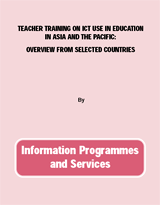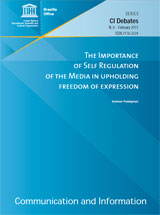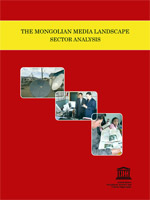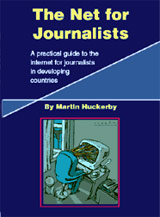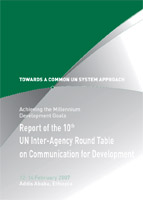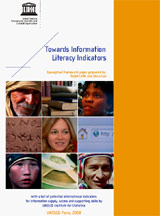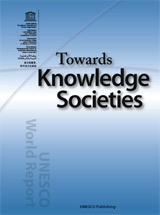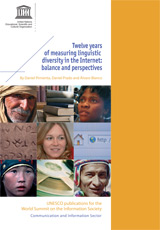Guiding principles for planners in education ministries and teacher-training colleges about when and how distance education can be used successfully to expand and upgrade the skills of the teaching force.
Publication year: 2002
This publication is an initial inventory of professional development and teacher training programmes on ICT from selected countries in Asia and the Pacific. This is an ongoing project, whose final goal is to benefit countries in the region in improving their teacher training activities in ICT.
Publication year: 2003
This monograph is intended to help educational decision makers survey the technological landscape and its relevance to educational reform. It is firmly rooted in a vision of education that begins with the learner and attempts to understand how technological tools can better contribute to educational goals.
Publication year: 2002
Ten Steps for establishing a sustainable Multipurpose Community Telecentre (MCT) is intended to assist comunities to walk through the basic requirements which need to be addressed when setting out to open and operate a successful MCT.
Publication year: 2002
This booklet contains stories and information collected from the field over a period of a few weeks in April 2007. The authors visited several Nepal districts and organized individual and group discussions with local journalists to hear their views on press freedom, the safety of journalists and impunity.
Publication year: 2007
This guide is intended to provide local entrepreneurs with a blueprint for the establishment of a business capable of receiving used PCs and related equipment. It also provides guidance on how to manage such equipment in a profitable and environmentally sound manner, while ensuring worker health and safety.
Publication year: 2008
This study, written by Andrew Puddephatt, focuses on different angles of self-regulation applied to the media sector. It summarizes the intersections of the theme with the practice of journalism, the editorial principles and strategies for corporate social responsibility.
Publication year: 2011
This media sector analysis identifies a set of critical problems for the development of free and independent media in Mongolia. As an overall assessment the media sector still faces challenges in fulfilling its pivotal role in the democratization process as a watchdog and as the provider of relevant and independent information for the public.
Publication year: 2007
This training handbook is a resource (with a printed manual and a CD) designed for both print and broadcast journalists and journalism students in developing countries around the globe. The accompanying CD contains some software, other extra resources and lesson plans for trainers.
Publication year: 2006
This publication is the first in-depth study about the most recent and relevant trend in journalistic reporting on police, criminality and security policies. The collection of information and the blogs’ analysis were done through an Internet survey answered by 73 police bloggers, authors of 70 blogs, between May and June 2009.
Publication year: 2009
This study, written by international experts, Toby Mendel and Eve Salomon, is an investigation of the current regulatory situation of the Brazilian media system in comparison with current practices in ten other democracies (Canada, Chile, France, Germany, Jamaica, Malaysia, South Africa, Thailand, United Kingdom and United States of America) and with recommendations of international law.
Publication year: 2011
This legal survey, published by UNESCO’s Office in Quito, compares the existing right to information laws in 11 Latin American countries: Chile, Colombia, Dominican Republic, Ecuador, Guatemala, Honduras, Mexico, Nicaragua, Panama, Peru and Uruguay.
Publication year: 2009
This document was prepared as a background paper for the 10th UN Inter-Agency Round Table on Communication for Development, which is to be held in Addis Ababa from 12 to 14 February 2007, in line with the UN General Assembly Resolution A/RES/51/172 of December 1996. This publication provides an overview of the issues that were covered during the Round Table, as well as suggestions as to how inter-agency coordination can be improved, both at headquarters and at country level.
Publication year: 2007
This report summarizes the proceedings of the 10th UN Inter-agency Communication for Development Round Table, held at the United Nations Conference Centre in Addis Ababa, Ethiopia, from 12 to 14 February 2007. The Round Table was convened on the theme ‘Harnessing Communication to Achieve the Millennium Development Goals: Towards a Common System Approach’.
Publication year: 2007
Towards inclusive knowledge societies: a review of UNESCO's action in implementing the WSIS outcomes
This report reviews the UNESCO’s work in these implementation areas during the five years since the Tunis phase of the World Summit on the Information Society (WSIS) in 2005. It summarises some highlights of what has been achieved to date and reflects upon the challenges which have arisen in the implementation of WSIS outcomes.
Publication year: 2010
This book provides a basic conceptual framework for measuring information literacy and is designed to serve as a reference to facilitate the elaboration of information literacy indicators.
Publication year: 2008
The UNESCO World Report on knowledge societies for all has been released at a crucial moment. After the achievements of the first phase of the World Summit on the Information Society, there is fresh international interest in the growth and development paradigm that bears within it the idea of “knowledge societies”. We are witnessing the emergence of a need for clarification of its aims as a project of society. This is the challenge that the UNESCO World Report intends to address on the eve of decisive international meetings.
Publication year: 2005
The research, conducted in 2004-2005 under a UNESCOP project and presented in this book, provides an overview of the main trends in the broadcasting and audiovisual industry worldwide, with a focus on regional patterns of production, consumption and trade in Africa, Asia and Latin America.
Publication year: 2006
Written by Daniel Pimienta, Daniel Prado and Alvaro Blanco, this publication is an update to the previous UNESCO study on this subject that was issued for the World Summit on the Information Society in 2005.
Publication year: 2009






